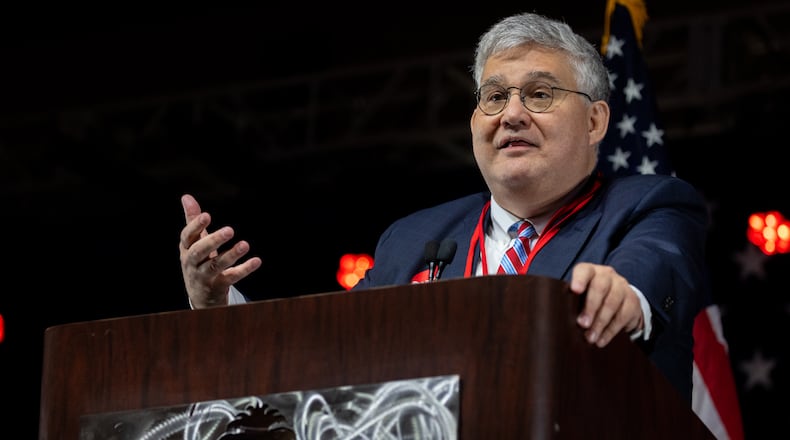Georgia GOP Chair David Shafer told Republican officials he’s not running for another term amid backlash over the party’s performance during the past two election cycles and scrutiny from prosecutors for his role in promoting Donald Trump’s lies claiming election fraud.
Shafer, a former state senator, informed members of the state GOP committee on Friday that he won’t seek a third term when the party votes this summer, according to three senior Republican officials who shared an email he sent to activists.
“I have felt for some time that I should re-focus on my family which would include, at least for the short term, scaling back on my volunteer activities,” Shafer wrote in the email, which endorsed former state Sen. Josh McKoon as his successor.
Shafer announced his plans amid a brewing revolt from activists. He already faced a challenge from Rebecca Yardley, the 9th District GOP chair who entered the race with a pledge to energize the party’s grassroots. Others could soon announce their candidacies.
Shafer led the party during devastating losses in the 2020 election cycle that cost Republicans control of the U.S. Senate and helped tank Trump’s bid for a second term as president, then blamed Secretary of State Brad Raffensperger for the defeats.
Credit: Nathan Posner
Credit: Nathan Posner
He was a key promoter of Trump’s election fraud lies, and his role as a “fake” elector has potentially put him in the crosshairs of state and federal investigators weighing whether to file criminal charges against the former president and his allies on allegations they tried to illegally overturn the election.
Shafer alienated many of the state’s most powerful Republicans for picking the pro-Trump losing side in party primaries. Among them is Gov. Brian Kemp, the state’s most popular Republican, who has used his leadership committee to circumvent Shafer.
His supporters have touted his organizational efforts. Georgia GOP Executive Director Ryan Caudelle — a former Trump staffer — said Shafer’s leadership enabled “record-breaking” outreach in 2022, with more than 5.2 million doors knocked and 2.5 million calls made.
“The Georgia Republican Party’s efforts translated into winning every nonfederal statewide office, reelecting our legislative majorities and picking up a seat in Congress,” Caudelle said. “And we did it without going into debt.”
Republicans won every statewide contest last year but one: the U.S. Senate runoff between Democratic incumbent Raphael Warnock and Herschel Walker, the former football star who was closely allied with Shafer and the Trump wing of the party.
A tortured tenure
Long a controversial figure within the party, Shafer was one of the state Senate’s most powerful Republicans when he waged a 2018 campaign for lieutenant governor. That ended in a surprise runoff defeat to Geoff Duncan, then a little-known state House member who referred to the party favorite as “Shady Shafer” and routinely questioned his ethics.
Within months, though, Shafer capped a political comeback by winning a competitive bid for Georgia GOP chair with promises to tend to a “neglected” grassroots and dire warnings that Democrats were on the verge of roaring back to legitimacy.
But Shafer was a troubled mascot for party unity.
Under his watch, the party grew more isolated from Republican elected officials, while internal divides over Trump only sharpened. And he continued to war privately with Duncan, his old adversary, who was the state’s No. 2 politician for much of his stint in party leadership.
After bruising defeats in the 2020 election, Shafer only reinforced his loyalty to Trump by echoing his election fraud lies and defending his role in orchestrating the “fake” slate of GOP electors that is now under the legal microscope.
In the state party’s high-gloss “After Action Report” distributed a year after President Joe Biden’s narrow Georgia victory and the Republican Senate runoff losses, there was little mention of what the party could learn from the defeats but instead a manifesto of what Shafer and allies did right.
Instead, Shafer and his allies heaped scorn on Raffensperger for “foolish settlements and feckless ‘emergency’ rules” that led the state party to file litigation to “force him to obey the law and do his job.”
Left unmentioned was the fact that Raffensperger and other officials found no evidence of widespread irregularities. Three tallies of the results confirmed Biden’s victory, an audit of absentee ballot signatures found no cases of fraud, and pro-Trump lawsuits were dismissed from court.
Credit: RNC Video
Credit: RNC Video
And he infuriated many rank-and-file Republicans in September 2021 when he spoke at a Trump rally in Perry that the former president used to bash Kemp and other GOP incumbents.
Even Shafer’s allies acknowledged he played favorites, including backing then-U.S. Rep. Jody Hice over Raffensperger in the GOP primary. Hice was soundly defeated, along with Trump-backed challengers to Kemp, Attorney General Chris Carr and Insurance Commissioner John King.
Shafer’s memo to party leaders on Friday framed himself as an aggrieved victim of partisan politics. He depicted 2022 as “an incredibly dark environment in which the organs of law enforcement have been weaponized against Republicans.”
He wrote that he’s been subpoenaed by the U.S. House’s Jan. 6 committee, visited by federal agents and listed as a “target” for potential criminal prosecution by Fulton County District Attorney Fani Willis as part of her probe of Trump’s effort to overturn the election.
And, in what he highlighted as one of his final acts, Shafer praised the state party for agreeing to finance the legal expenses of the 14 phony electors who also could face criminal charges.
“I have raised the money to honor that commitment,” he wrote, “so that none of them have had to pay a penny out of pocket.”
About the Author
The Latest
Featured






